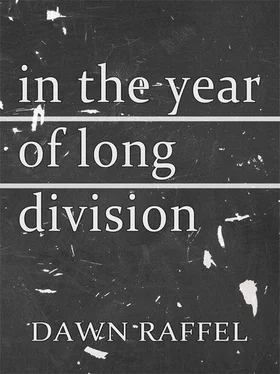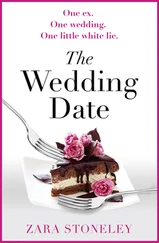“Drink,” the voice said.
She had been urged not to touch it. Her hand had been licked. Her pocketbook lay in a sprawl at the edge of her thoughts. Crickets in the field where she lay. A hand to the hair. A full-bodied fluid in the mouth. Ida, oh, Ida. The name rang wrong in the ear.
“Does the name ring wrong in the ear?” Rex — for it was certainly Rex — seemed to purr.
“Wrong?” she said. Outside here were weeds, she knew, and vines, and there were rotted-out slats, and doors half out of their rotted-out hinges, and ravening creatures of the ravening night. “Wrong?” she said. “What is it that you’ve done? Do you call it a skill, this thing, whatever it is? Do you call it a gift? Is it some kind of evil gift?”
Her eyes were half-open. Her clothes, it seemed to her, had been completely disarranged. “Were it not for Mr. Edward…” she said.
“Then what?” Rex said.
“Don’t try me,” Ida said. Her cheeks felt newly and familiarly rashy. Hives, she thought. She would tell Mr. Edward, if ever she saw Mr. Edward again (to think of it distressed her, but was he not, in fact, quite frail, quite terribly frail? She could scarcely assemble specifics of the face, the stance. The nose, she thought, was it not bent ever so slightly, as if it had been broken; the forehead, as she had told herself, in phrases she had written in her mind and had taken dearly to heart, had saved as if for speech, for an appropriately elevated discourse, and not for such a man such as Rex to presume to read into her inmost thoughts, was it ever so high? How well had he held the pen in his hand?), she would tell Mr. Edward…what? That she had been robbed? That she had got lost? Had lost her way? It was, after all, a scrap, potentially illegible.
The hand was less than steady.
Penny, she saw, had got hold of the hat, small measure of shade, and was gnawing, with violent patience, the rim.
“I am not quite well,” said Ida. “Listen to me.”
“Not well,” said Rex. “And nor am I.”
The sight of it! Straw after straw in the mouth. She could scarcely remember the look of the hat or the feel of the hat on herself. Her face would not come back to her. Towel to the hairline—“Please…” she said. “Mr. Edward…” she said. “Our mutual acquaintance. .” she said. “Why, I promised…” she said.
Her pocketbook lay open and empty, she saw, a gaping, a leathery and tongueless, mouth.
There was nothing of hers.
No personal effect.
Not a scrap.
“Mr. Edward is gone,” Rex said.
“Gone?” she said.
The dog had moved on to the ribbon of the hat.
“Gone,” Rex said, “passed out of this life.”
Through no known office of body or mind, she saw that this was so, saw the man, Mr. Edward, standing before her, leaked ink wounding the front of the shirt; he was yellowly breathing, and gone.
The hand held out was sallower than ever before.
Ida stood and took a step. She limped. She had not lost her limp.
The dog’s cheeks bulged.
The dog’s eyes brightened.
“Penny,” said Ida, and lowered herself to get hold of a shoe, to get hold of a lace, to untie the thing. “Penelope,” she said, “come here — come on.”
HERE is my father. He is tucking in a tongue. Coaxing. Lacing, doubling a knot. My ankles are weak. The rink is lit. My father’s hands are darkly livered, veined. Use, he says, has done this.
“Can you stand?” my father says.
The ice, I see, is swept, wet, white. “Try standing,” my father says. “Up.” There is forcefully dampered music, piped. There is no sky. No rain, no threat. “See it?” my father says. “Look.” No hint. It used to be something else, this forceful place. “Before your time,” he says.
He looks like my father.
“Gone,” he says.
“Dad?” I say. I am gaining my feet. There is something, I think, or nothing, hairline, cleft.
Deep. The voice. “Steady.”
A person could be dizzy.
“You almost can see it.”
“Dad?” I say.
It is dizzying.
“Things I could tell you,” my father is telling me. He is inflection, timbre; unfamiliar and expected in the faraway, fatherly way he always has. “Gloves…” he says. “Folds…” I feel the after-rills of phrases, words between the words I am invariably failing to catch. “A curtain there…an arch…”
A ramp’s slope.
What I want is to skate. I do. Want to. Want and want to want. Pulsing my toes, my fingers restless, ragged-nailed. “Now?” I say.
My father is talking marble and Saturday. “Nights,” he says, whatever, I don’t know. “Glass,” he says, or “Hats,” he says.
“Tails,” he says.
“These skates,” I say. “My toes.”
My father is pressing for fit, says, “Gutted.” I feel it. “Better?” he says.
I have had practice.
“Better,” I say. “Better, please.” My ankles flinch.
There is a woman in the middle of the middle of the ice, going backward. Curve and grace is what she is, and speed, and speed.
There is knowing in the body. My father is touching my elbow, glancingly, knowingly, fluidly moving beside me, before me, ushering me from behind.
“The center is lower,” my father says, “in a girl.”
The woman appears to me to be weightless.
“Why?” I say. “What center?”
“Didn’t I tell you?” my father says.
She is all lift.
I am in a wobble.
“Never mind,” my father says.
I am making my father fall, almost. I almost could.
“Easy, easy does it,” my father says. “Use your head, for heaven’s sake.”
I am flailing for his arm. “Tell me,” I say. “Now.” My father is smartly just past reach. “Why?” I say.
“You know,” he says, “a person can not hear you.”
Habit. Fearborne. Sleeves, snaps, cuffs. I am speaking to a bead, to a fearful pearlish glinting in myself. “This place,” I say, “was what?”
“Careful,” my father says.
There is a ceiling, of course. Always was. Flight’s worth up. It burns, the ice, rebukes my back. Flat flung limbs. Nothing is broken, my father says. Birds, I say. It is terribly high, even given style, even given flights, even given tricks with scarves. A person could stand on a person’s shoulders, given even balance, a bent for stunt, feint — a lady fluttering, swooning, waft and lilt and pale, light, sweet perfume, airily, deftly arcing off a balcony — taken down, removed.
My father is furrow and how many fingers.
“Who?” I say.
“Who do I look like? Please,” I say.
“My name?” I say.
“What day?” I say.
“Wait,” I say. “My ankle,” I say, “hurts.” It all comes back — oh, the power of the powerfully helpless. “Hurts,” I say.
“Let me,” my father says. “Will you?”
“WON’T,” I say. “Will not,” I say, “help.” This is only a portion of an answer in advance.
Now you see it: My father’s skates are scarred, if from daring or storage, I do not know — in houses, cellars, wrecked and vaulted rooms, strewn, or bound, paired, dolled in attic rags, sleeves, yokes, the ruined drapes, the molded sheets — in plundered trunks, a chest; a lavish efflux: See under spawn and brackish fissure, over sunken seams, ridge, reef; see under floe; see under yaw, in another time zone, found.
By the way, I am married.
“Won’t,” I say, “help.”
I am kneeling and fanning and lying.
I am not a child.
“Let me,” my father says, “see it?”
I say, “Will you?”
I SAY, “Please,” or I say, “Look,” or “Hurts,” I say. He is touching my elbow, hair, my arm. We are in an aisle; he is touching a veil, net, necklace — luminous, inherited; I am carrying lilies; there is no breeze; I am carrying nothing, blood; we are in rooms, in years, in the rending of an instant, cleaving in the yawning dark, curled, here, gone. He is touching a shoulder — blade, wing — nobbed, insistent back. “What?” he says. “I can’t,” he says, “hear you, make sense of you, the way you turn away.”
Читать дальше












